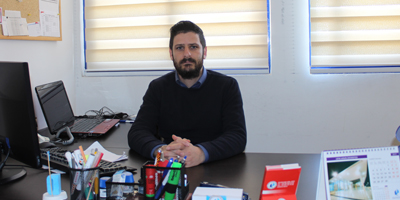Water is the Vital Element for all Living Beings
Think Twice, not Once when using Water
Academician of the European University of Lefke (EUL) Faculty of Engineering Department of Environmental Sciences Assist. Prof. Dr. Devrim Özdal made some statements on the occasion of “22 March World Water Day” and conveyed detailed information.
Özdal: It is very important to ensure that everyone has access to safe water and sanitary / hygienic conditions.
Pointing out that World Water Day is celebrated on 22nd March every year in order to attract attention to the importance of available water supplies and the sustainability of these supplies, Özdal said that this year’s theme is determined as ‘Leaving no one behind,’ by the organizing association United Nations (UN). Özdal said that “As stated in the main message of the UN World Water Development Report 2019, it is very important to emphasize the theme ‘Leaving no one behind,’ and to ensure that everyone has access to safe water and sanitary / hygienic conditions in order to eradicate poverty, to create peaceful and prosperous societies on the road to sustainable development. Özdal further stated that recommendations on the World Water Day were first put forward at the United Nations Conference on Environment and Development (UNCED) in 1992 and added that after the official signing of this proposal by the United Nations General Assembly on 22 March 1993, the World Water Day is celebrated every year.
Özdal: Access to available water is one of the common and biggest problems of all countries in the world
Özdal said that “As you all know, water is the vital element for all living beings. Access to available water is one of the common and biggest problems of all countries in the world” and added that although approximately 71% of the world is covered with water, 97.5% of this amount is not suitable for human consumption because it consists of salt. Pointing out that the remaining 2.5% is composed of fresh water resources and the rivers and lakes make up approximately 1% of this section, Özdal said that the total amount of water and the amount of surface water that can be used when these quantities are taken into account is even less than 1%. He further said that “In other words, the world population of approximately 7.6 billion people cannot use only 1% of the water in the world. Looking at this table, we can understand once again how important access to clean water is” and added that according to the World Health Organization 2015 data, approximately 71% of the world’s population can reach clean and safe water whenever they need, while the remaining 29% have problems reaching clean water.
Özdal: We can leave more water to future generations by using water with simple saving measures that everyone can apply at home
Özdal stated that by 2025, this ratio will increase to 50%, that is, half of the world’s population is expected to not to be able to reach clean and safe water and added that “Therefore, as the world’s population, our duty is to improve the existing water conditions and to conserve water”. He further said that therefore, We can leave more water to future generations by using water with simple saving measures that everyone will apply at home and added that “To give examples of these savings applications; the water spent brushing our teeth is one of the most important of our unnecessary water consumption. Do not allow water to flow unnecessarily when brushing your teeth”. Emphasizing that after wetting the brush the tab should be closed and kept close until the rinsing time, Özdal said that “Apply these methods when shaving. Old showerheads consume a lot of water, prefer new shower heads that use less water, and avoid showering unnecessarily while showering, reducing shower time”. Özdal also said that instead of washing dishes manually, the dishwasher should be preferred and it should not be operated before the machine is full and added that “Check your home for any water leakage”. Özdal said that according to the Environmental Protection Agency (EPA), the use of automatic irrigation systems such as dripping, instead of watering in the garden, provides a water saving of 33%.
Özdal: Think twice, not once when using water
Özdal said that “We can reduce water consumption and leave more water to future generations with the simple saving measures that everyone will apply at home” and underlined the importance of increasing the awareness of individuals by organizing educational seminars in the educational institutions starting from the young ages and including these in the course syllabuses or in the seminars accompanied by the civilian population. Özdal finally said that “Think twice, not once when using water”.

